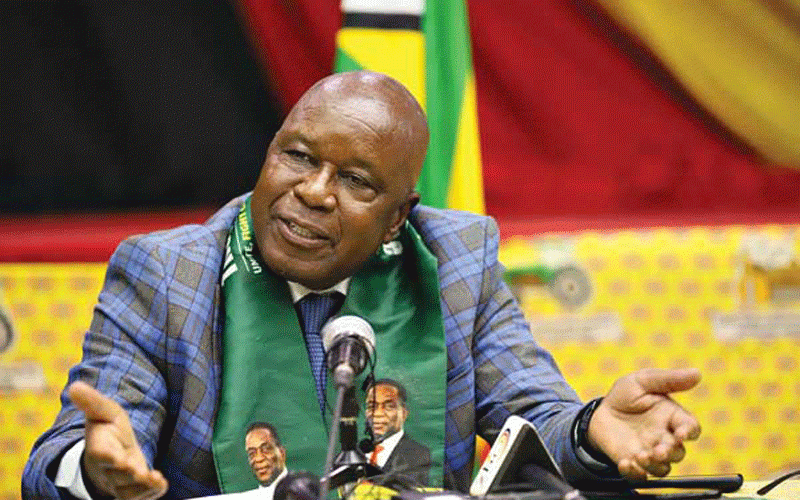
IT is so embarrassing that a grown-up person like Zanu PF spokesperson Chris Mutsvangwa blames the late former President Robert Mugabe for all the woes the country is facing, especially on this current power crisis being experienced in the country and yet he was part and parcel of the problem.
It’s unfortunate that the same people who are blaming Mugabe want to seek another five-year term to employ the same blame game.
This so-called new dispensation is just a scam. It must come up with concrete and long-term solutions to the challenges facing the country than being crybabies.
This circus of blaming Mugabe who is not around will not solve the crisis the nation is facing. People must learn to take responsibility for their shortcomings and move forward. They must allow Mugabe to rest in peace.
Most of those in leadership were in government together with Mugabe for 37 years. Blaming the dead for poor governance is a hallmark of a failed leadership.
Admitting that they have dismally failed is the right thing to do rather than shifting the blame on somebody whom they know is dead and cannot defend or respond to the allegations.
Zanu PF as a whole has failed the nation from the beginning when they took over power from the colonial masters.
They have absolutely destroyed nearly everything.
- Young entrepreneur dreams big
- Chibuku NeShamwari holds onto ethos of culture
- Health talk: Be wary of measles, its a deadly disease
- Macheso, Dhewa inspired me: Chinembiri
Keep Reading
President Emmerson Mnangagwa and his party have failed the nation.
He should be judged on the targets he set for himself upon taking oath of office in November 2017.
He made so many promises to the nation, but little has been achieved.
The unemployment rate is still soaring and the cost of living is spiralling upwards.
The living standards of the majority is deteriorating each and everyday, serve for a few politically-connected individuals who are benefiting from the feeding trough.
Zimbabwe is slowly getting closer to a failed state where it cannot provide its own people with basic needs.
We have allowed such kind of leaders to determine our future. Giving them another term would spell doom to the nation. - Leonard Koni
Make education affordable, increase morale of workers in education value chain
IN the current globalisation and technological advancement era, only countries with a developed human capital enjoy increased competitive advantage.
On the contrary, in Zimbabwe, human capital development continues on a downward trend mainly due to a tightening macroeconomic situation resulting in high education costs, limited funding for expansion of learning infrastructure, student grants and research and development.
In the 2023 national budget, government allocated 14% of the budget or $631,3 billion to Primary and Secondary Education (to provide quality infant, junior and secondary education, with the bulk of the allocation going towards payment of salaries for teachers and other learning costs) and 3,47% of the budget or $156,5 billion to Higher and Tertiary Education (for development of a skilled and competent human capital, including support to universities, teachers’ colleges and polytechnic colleges).
These paltry budgetary allocations will not do much to improve the education service delivery as the situation is currently dire.
For primary and secondary education it is critical to note that the share of extremely poor children and children in rural areas with access to mobile learning apps remains severely constrained; with public education collapsing, the poorest cannot not afford private lessons; greater dropouts in high in the strained economic environments where some parents are no longer able to send children to school with about 400 000 children aged six to 17 years old were out of school by May 2019 and greater susceptibility of children to different forms of abuse including drug and substance abuse when out of school.
The local tertiary education institutions continue to lag behind their regional counterparts with respect to research funding.
There is little progress in the development of innovative methods of production and new products.
In view of that, there is a need for government to shift toward free basic education for all, increase investment in education infrastructures such as classrooms dormitories, laboratories, and sanitation facilities, especially in underdeveloped communities.
Also, government should make tertiary education affordable, fund research and development, and increase the morale of workers in the education value chain. - Zimbabwe Coalition on Debt and Development
Long COVID-19 is real and deserves support for rehabilitation
IN October 2022, the World Health Organization (WHO) released a fact sheet that states that between 10% and 20% of people who are diagnosed with COVID-19 continue to have symptoms beyond three months of first getting ill and develop what the WHO refers to as post-COVID-19 condition.
Many more people say symptoms plague them still even after nearly two years.
The condition can be debilitating, causing disabling symptoms and functional deficits. It can significantly impact people’s ability to work, engage and participate fully in family and community life.
“Mental health effects can directly result from long COVID-19, but may also develop due to prolonged suffering and distress caused by the condition,” reads the WHO fact sheet.
The WHO’s recommended treatment, however, is non-specific, stating: “Post-COVID-19 condition can be supported with help from their families, peers, employers and the community and they can also benefit from tailored rehabilitation.”
According to the National Institute for Communicable Diseases (NICD), “every long COVID-19 patient is different, as such, every patient will need treatment specific to their symptoms which can be managed by their family doctor or clinic. There are no drugs to prevent long COVID-19. Long COVID-19 is not a contraindication to vaccination, and COVID-19 vaccination may even sometimes improve long COVID-19 symptoms. Long COVID-19 is treated by slow, step-wise rehabilitation, and appropriate management of symptoms.”
The non-specific and the unknowns are the biggest challenges to getting a better handle on how to manage, treat and cure long COVID-19. Research must advance and, along with this, there needs to be unequivocal recognition that long COVID-19 is real and deserves support for rehabilitation.
It’s so difficult to know exactly what we are looking at, but what is sure is that it is a dysfunctional, debilitating entity.
There appears to be distinct categories among sufferers, but we don’t know what each brings to the table. There is a genetic component because we see long COVID-19 in certain populations much more than in others.
And then there is also thrombo-inflammation. This is when there is ongoing small clot formation in the smallest part of the circulatory system, the capillaries, and this causes organ dysfunction. There’s also ongoing inflammation, so this is dysregulated inflammation.
For many people, COVID-19 will trigger an autoimmune disease like lupus or rheumatoid arthritis because their immune system is just so dysregulated.
Dysregulation is when the body cannot switch off the immune response or the inflammation response once it fights off an illness successfully.
We need our immune response, also our inflammation response, but we also need this to be curbed once an insult to the body is gone. It seems like there is chronic, ongoing dysregulation, but we also can’t non-specifically suppress an immune system. - Ufrieda











